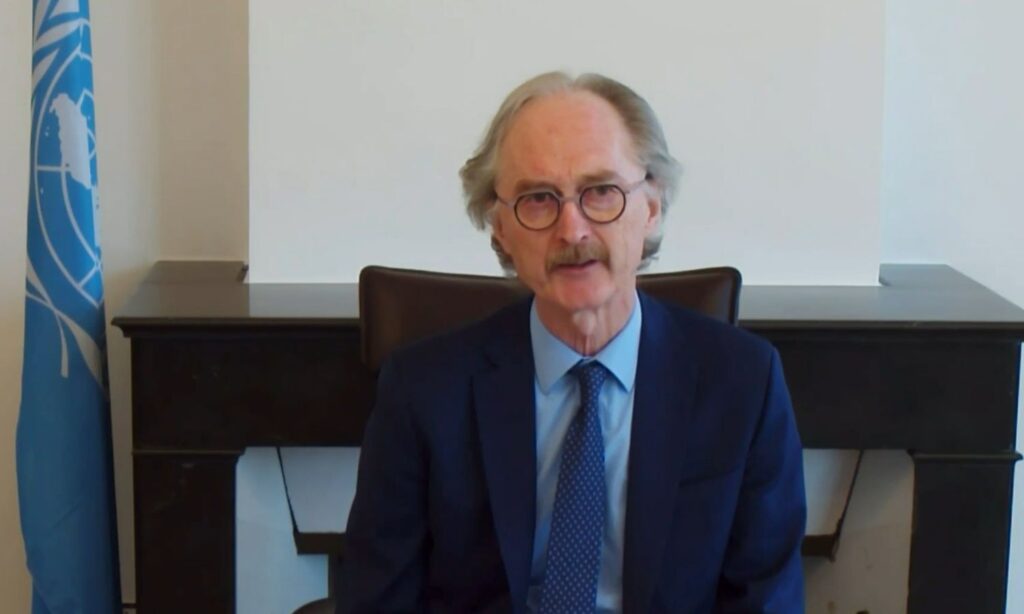The UN Special Envoy to Syria, Geir Pedersen, stated that after 13 years of “conflict” in Syria, and despite a year of new diplomatic efforts, the tragic reality is that all developments are moving in the wrong direction, in terms of security, humanitarian situation, human rights, the economy, and politics. He expressed his dismay at the course of events and the lack of progress.
During a Security Council meeting on the situation in Syria, Pedersen discussed the political developments and the humanitarian situation on Thursday, March 21.
He pointed to the security situation and the occurrence of severe violence upon many, the continuation of regional repercussions, more Israeli strikes, and the escalation of violence in Idlib, where “government”-loyal airstrikes were conducted, and drones were used.
Pedersen also referred to aerial movements on the Jordanian border with Syria and attacks by the Islamic State organization against truffle gatherers in the desert.
According to the UN envoy, de-escalating the conflict in Syria is urgent, with the necessity to build on the current ceasefire, and to achieve a nationwide ceasefire in line with Security Council Resolution “2254,” while ensuring the protection of civilians and infrastructure.
He reminded of the 16.7 million Syrians in need of humanitarian aid, calling upon donor countries to generously donate for the humanitarian response and early recovery, amidst an economic collapse and institutional degradation affecting millions.
Pedersen reminded that there are more than 100,000 forcibly detained or missing persons in Syria, without progress on newsletters and information on the fate and whereabouts of the missing, and access to all detention places. Reports continue to emerge about arbitrary detentions, kidnappings, torture, and sexual violence in some detention places across several regions in Syria.
He also referred to the concerns of displaced Syrians and refugees, many of whom do not wish to return to Syria for reasons related to protection and livelihoods.
The political path is blocked
The UN envoy pointed to the continued peaceful protests in Syria and the emergence of citizens onto the streets in some areas expressing grievances that have not been addressed, according to him.
He referred to demonstrations in northwestern Syria, Daraa in the south, and As-Suwayda which has been continuing its protests for about eight months, in addition to protests in Idlib, which raises the number of armies in Syria to six instead of five, as well as armed actors, and this distancing deepens the challenge of restoring Syria’s sovereignty, unity, and independence.
The envoy stressed that there is no military way to solve these countless challenges, and that a comprehensive political solution is the only way to achieve this, but the political path is stalled and sluggish.
The Constitutional Committee
Regarding the Syrian Constitutional Committee (SCC), Pedersen clarified that he invited the parties for a ninth round in Geneva, which was agreed to by the negotiating body, but the Syrian regime did not do so. He mentioned ongoing contacts on this matter and openness to any alternative location that enjoys the consensus of both parties and the host.
If there is no agreement on an alternative location, Pedersen will continue to work to hold the session in Geneva, within a process led and owned by the Syrians, explaining that he has urged the parties to be prepared to present constitutional proposals.
As for confidence-building measures (step-by-step), there are concrete ideas on the table, and he has called for the Syrian regime to engage in a detailed and tangible process, and in the dialogue that will be necessary to develop mutual and parallel steps.
The Syrian Negotiation Commission (SNC) confirmed their desire to hold the next meeting of the Constitutional Committee in the Saudi capital, Riyadh, after Damascus and Moscow requested Pedersen to change the meeting location previously scheduled in Geneva, as conveyed by the Saudi newspaper Asharq Al-Awsat on March 19.
Badar Jamous, head of the Syrian Negotiation Commission, said, “As the head of the Negotiation Commission, I proposed to the United Nations and informed the brothers in Saudi Arabia our desire to have the meetings in Riyadh, especially since the Negotiation Commission was formed in Riyadh, and after Riyadh 1 and Riyadh 2 conferences. Subsequently, the envoy suggested Nairobi (the capital of Kenya), and we agreed to that, and currently, he has invited to Geneva and we agreed to that as well.”

